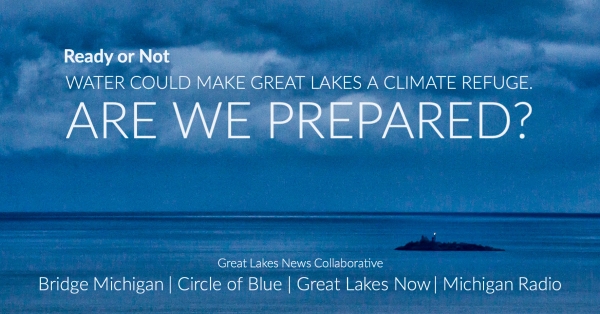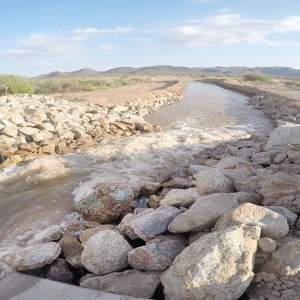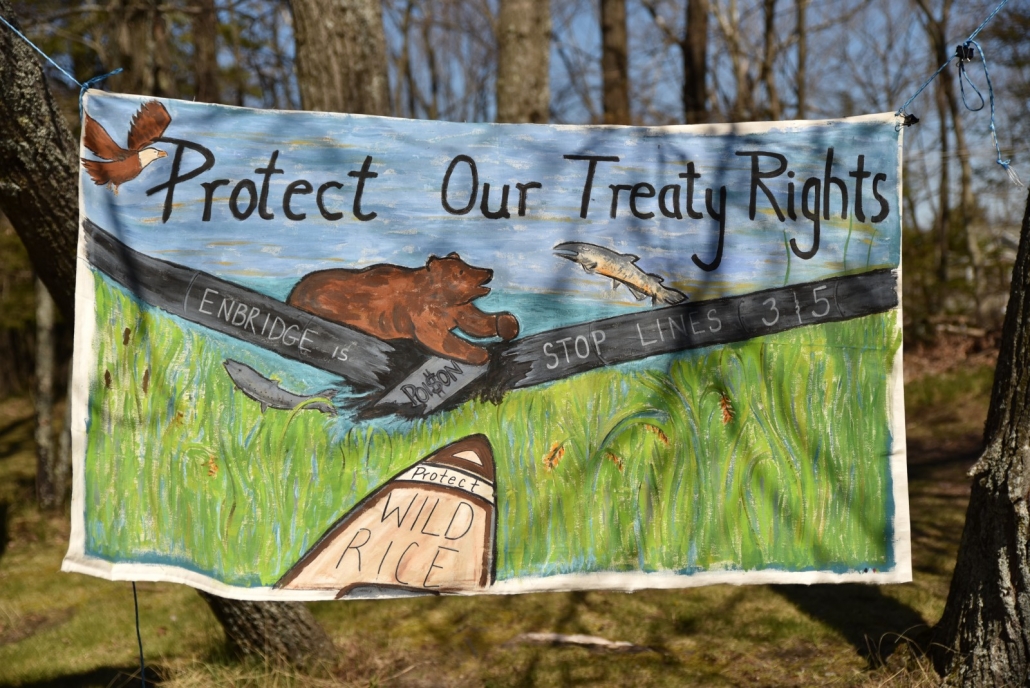
One of the many banners at the gathering of several different tribes’ members, calling for Enbridge to shut down its Line 5 pipelines in the Straits of Mackinac. Photo © Lester Graham, Michigan Radio
Lester Graham, The Environment Report, Michigan Radio, – May 12, 2021
Today environmental groups and Native Americans will be presenting Enbridge Energy with symbolic eviction notices. They want Enbirdge to abide by Governor Gretchen Whitmer’s order to shut down Line 5 in the Straits of Mackinac.
In November 2020, Governor Whitmer revoked the easement for Enbridge Energy’s Line 5 twin pipelines through the Straits of Mackinac, and gave the company 180 days to shut down that section of the pipelines, which carry light crude oil and natural gas liquids.
That deadline was Wednesday at midnight, and Enbridge says it has no intention of shutting the line down.
On Tuesday, Governor Whitmer pledged to try and seize any profits the company makes from the pipeline after that deadline, claiming trespass on state property.
In the background, the question of whether Whitmer’s November revocation notice was legal is playing out in the courts.
Michigan Attorney General Dana Nessel sued in circuit court to enforce the order, and Enbridge counter-sued in federal court. The two sides are now in court-ordered mediation over whether the legal dispute over the easement will be heard in state or federal court.
This will be the second day of events in Mackinaw City.
On Wednesday, a little two lane road and a fence topped with barbwire was all that separated Enbridge Energy’s big Line 5 pumping station and a little park where a lot of tribal members from all over the upper Midwest gathered. There were also some non-indigenous activists from the lower peninsula of Michigan with them to keep public pressure on the Canadian pipeline company.
It was a lot of music some ceremonies and many people taking turns with the microphone, reminding each other how precious the Great Lakes and particularly the Straits of Mackinac are to the tribes.
Occasionally there were chants of “Shut down Line 5,” but mostly it was people expressing concern, worry, and frustration. If there were a pipeline rupture, it would ruin fishing in the area. It would ruin livelihoods for many tribal members. It would ruin the economy. And, of course, it would ruin the environment.
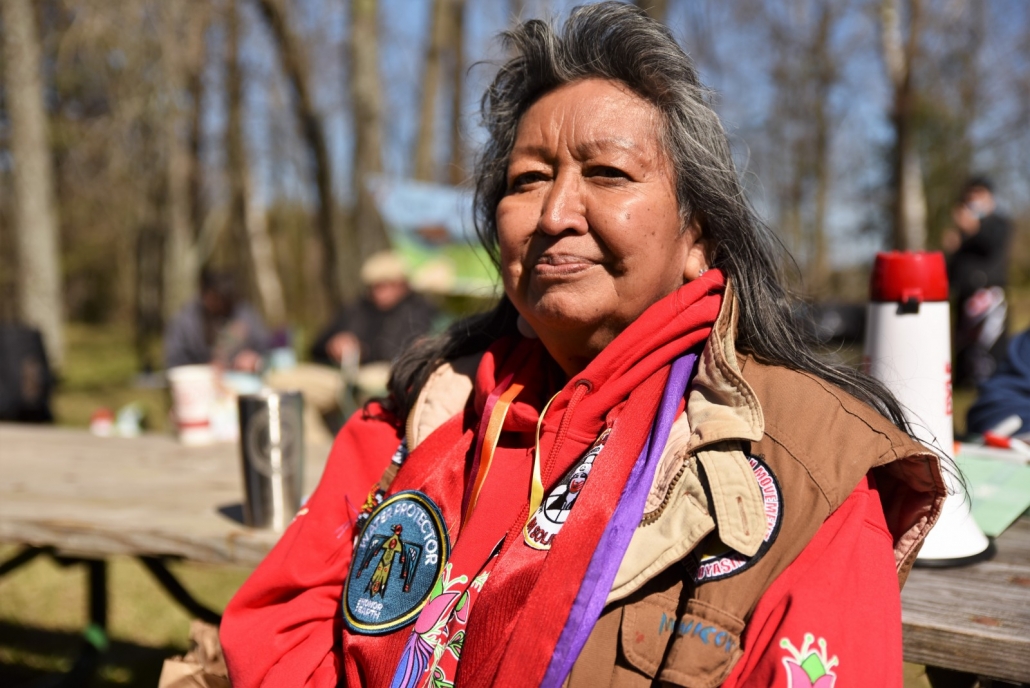
Beatrice Menese’ Kwe Jackson is a water protector. Photo © Lester Graham, Michigan Radio
Beatrice Menese’ Kwe Jackson from a tribe where the grandmothers lead the community and they are the protectors of water.
“I am Tlingit, Tsimshian. My people are from the West Coast. They’re the totem pole people,” she explained.
She lives in Cedarville, Michigan now, but she performs water ceremonies all over North America. She says this gathering is partly that and partly reminding non-tribal people of the importance of the Great Lakes.
“The whole slogan is ‘Water is life,’ and to let every human being know that they have a vested interest in keeping our water pure and clean, and this is the biggest supply of fresh water in the whole world. Every one of us, no matter what your race is or your political persuasion or anything, that we have to make sure this water is good,” she said.
And rather than being confrontational, some members such as Ray St. Clair think it’s about understanding.
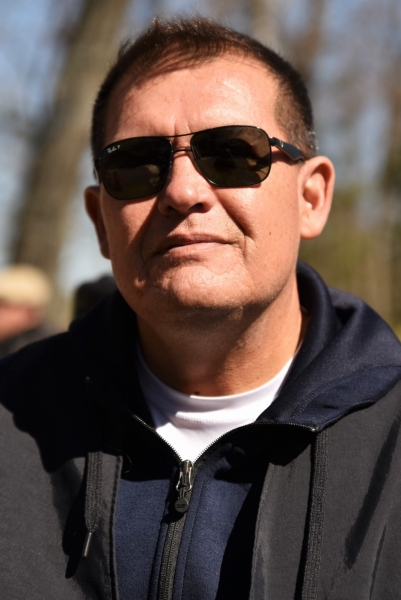
Ray St. Clair is with the White Earth Band of Ojibwe in Minnesota, but he lives in Michigan. Photo ©
Lester Graham, Michigan Radio
“As a Native American person from where I’m at, it’s time to start educating the non-native people The way that we can get there is peace and unity, so that’s why I came up here,” he said.
An activist who didn’t belong to a tribe has been thinking about polluted water for a while. He says he worked at a touristy island in the Gulf of Mexico. He and a lot of others lost their jobs when the BP Deepwater Horizon oil rig gushed oil for almost three months. So, he moved back to Flint, only to find another case of water being contaminated. Aaron Block says he doesn’t trust Enbridge and its Line 5.
“The threat of them damaging our Straits, or our drinking supply or our water, our environment, it doesn’t outweigh some fat cats making a few more bucks. That pipeline needs to stop flowing.”
Among the people taking a turn telling their stories of concern about water was Doug Craven. He thinks about water and wildlife every day. He’s the Natural Resources Director for the Little Traverse Bay Bands of Odawa Indians.
“That pipeline has been in there for 60 years plus was rated for 50 years. There’s potential for there to be a rupture and that would be catastrophic to our way of life, our use of the water, our commercial subsistence fishing, but also the greater non-tribal community as well. And we’re very concerned about that,” he said.
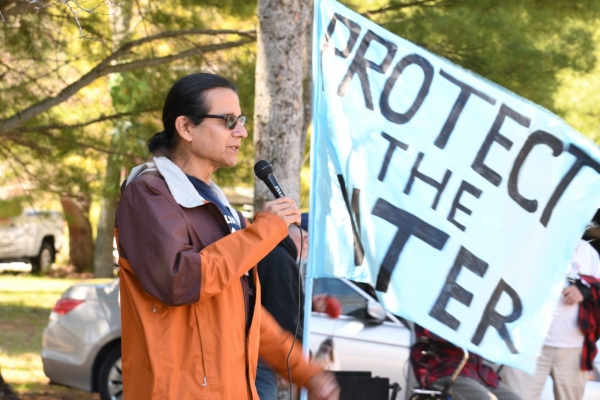
Nathan Wright speaks to the crowd. He was one of the organizers of the two dayevent in Mackinaw City. He is a member of the Sault Ste. Marie Tribe of Chippewa Indians. Photo © Lester Graham, Michigan Radio
One of the organizers of the two days of events is Nathan Wright. He’s with the Sault Ste. Marie Tribe of Chippewa Indians. He says his goal is not to fight Enbridge, but to reason with people who like the jobs and money that come with the pipeline.
He said a Native American elder recently found an Line 5 infiltrator in his group’s midst as they were about to perform a pipe ceremony. Usually they would be kicked out.
“Well, the elder didn’t have that perspective there, like, well, they’re there to participate in the ceremony. I’m going to let them. Maybe that guy kind of something touched his heart and he said these people aren’t bad. All these things that they told us are not true. They are here peacefully and they are here to defend their lands and defend their water. Who are we to sit there and tell them they shouldn’t do this?”
Wright says the gathering in Mackinaw City is more about bringing awareness to people who haven’t given the pipeline much thought. It’s also to let state leaders know there are people who care deeply about Line 5 and the damage it could do if it ruptured.
Ready or not — the Great Lakes as a climate refuge
The Great Lakes region is frequently touted as one of the most climate-resilient places in the U.S., in no small part because of its enviable water resources. But climate change threatens water quality, availability, and aging water infrastructure by exposing existing vulnerabilities and creating new ones. In this series, members of the Great Lakes News Collaborative explore what it may take to prepare the Great Lakes region for the future climatologists say we can expect.
Funded by the Charles Stewart Mott Foundation, the collaborative’s four nonprofit newsrooms — Bridge Michigan, Circle of Blue, Great Lakes Now at DPTV and Michigan Radio — aim to elevate discussion, amplify the voice of Michigan residents and produce action that protects the region’s waters for future generations. While Mott provides financial support, our public service journalism is produced independently.

